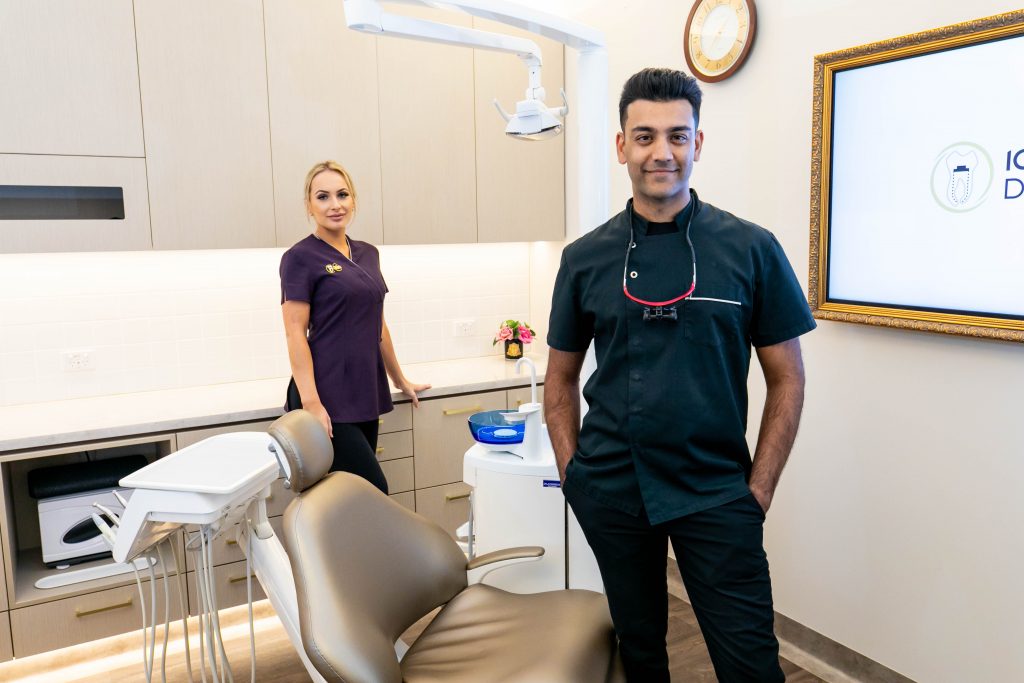
Tooth Structure & Tooth Pulp Damage
Teeth are made up of 3 different layers: the enamel, dentine and pulp. All of these can be damaged or irritated by various things such as: decay, fractures, tooth wear or stress.
The enamel is the outer layer of the tooth. There are no nerves in this area and usually if things are happening here, a person rarely feels any symptoms. This is also the strong layer that protects the rest of the tooth.
The dentine is the middle layer of the tooth which gives support to the enamel above. This does contain some nerve endings, so if it is irritated or exposed there may be some degree of sensitivity.
The pulp is the inner part of the tooth. This contains blood vessels and nerves. If the pulp is irritated or damaged, you would feel some degree of tooth ache. It may come and go; be sharp and shooting; dull and constant; or you may feel nothing at all.
When Is A Root Canal Treatment Needed?
A root canal treatment is needed when the pulp of the tooth undergoes irreversible damage. That is, when the pulp is starting to die off or has died off completely. If left untreated, bacteria and degenerated nerve tissue can result in severe abscess formation and may even cause sepsis of the body.
What Is A Root Canal Treatment?
A root canal treatment involves removing infected and necrotic (dead) nerve tissue from within the tooth. Once the tooth has been cleaned and disinfected, the nerve space is then sealed to prevent further ingress of bacteria. The treatment removes the nerve and leaves the remaining tooth intact.
The remaining tooth is often weakened by whatever caused the nerve to degenerate and will need to be reinforced to improve its strength. Usually a crown or ceramic filling is recommended after the root canal treatment is completed.
What Are The Signs & Symptoms Of Needing A Root Canal?
The signs and symptoms of needing a root canal are highly variable. As such, we cannot reach a diagnosis based purely on signs and symptoms. A diagnosis needs to be accompanied by a clinical examination including relevant x-rays. Some teeth that need a root canal may feel nothing at all and be completely asymptomatic to the person – but this doesn’t mean there’s no infection. It just means the person is unaware of an infection deep down. This still requires treatment as it is ongoing bacterial infection.
However, there are some signs and symptoms that will point more strongly to a tooth needing a root canal than others. These include:
- A severe tooth ache that comes and goes on its own;
- Tooth ache that keeps you awake at night;
- A constant dull ache;
- A sharp shooting pain that lingers on with a background dull ache;
- Tooth ache that you feel but can’t exactly pin point to a specific tooth;
- Extreme sensitivity to cold or hot; and numerous others.
Causes of Tooth Pulp Damage or Disease
There are numerous things that can damage the pulp of a tooth. There may be a single incident, or it may be cumulative damage over time that causes the pulp to eventually die off. This includes: severe decay, cracked teeth, trauma, repeated episodes of decay, repeated fractures of tooth or filling; severe wear; severe damage; and there is evidence that there is a genetic predisposition as well.
Root Canal Procedure
The root canal procedure removes organic debris from within the tooth, cleans it and seals it to prevent reinfection. The treatment often involves multiple visits. It is completed under local anaesthetics and involves use of a rubber dam. The treatment should feel just like getting a filling done. If it involves multiple visits, you will have a temporary filling in the interim which will be removed and replaced upon completion of the root canal treatment.
Is Getting A Root Canal Painful?
Getting a root canal is not a painful procedure. Treatment does not begin until you are sufficiently numb and we always test this prior to commencing. The appointment is longer than most filling appointments, so sometimes your jaw may feel tired at the end of the appointment. The tooth may feel a bit tender and delicate for a few days after the root canal appointment.
Do’s and Don’ts After A Root Canal
A tooth that has received a root canal treatment is generally more fragile than normal. Without the blood vessels of the pulp nourishing the tooth, it becomes more brittle. Also, without the nerves of the pulp people are often unaware of the amount of pressure they bite with. This combination tends to lead to people biting harder than normal on a tooth that is now weaker than normal – which is not a good thing. Please make a conscious effort to reduce your bite strength on teeth that have had a root canal treatment. Many teeth that receive a root canal will also require a ceramic crown to help protect it. Please ensure you receive this treatment in a timely manner to prevent accidental breakages.
Do I Need To Take Antibiotics After A Root Canal?
Root canal medicaments contain antimicrobial properties so it is rare to require oral antibiotics after a root canal treatment.
Can I Brush My Teeth After A Root Canal?
Yes! Please keep your tooth as clean as possible to prevent it from developing decay. This means brushing twice daily, and flossing once daily.
Looking for a root canal in Perth?
Our experienced team of root canal dentists in Perth can restore your tooth. Take a look at our range of general dentistry services, including dental implants, white fillings and crowns. Book into our South Perth location for your root canal today!
